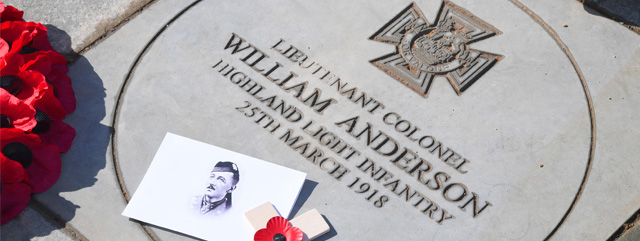- Glasgow City Council
- > News Archive
- > Archive News 2018
- > March 2018
- > Final Victoria Cross Memorial Paving Stone Laid in Honour of Glaswegian War Hero
Final Victoria Cross Memorial Paving Stone Laid in Honour of Glaswegian War Hero

A Glaswegian war hero posthumously decorated with the Victoria Cross has been honoured with the installation of a First World War commemorative paving stone outside the city's People's Palace.
Lieutenant Colonel William Herbert Anderson, affectionately known as Bertie, was the eldest of five brothers - four of whom fell in the Great War.
He was posthumously awarded the Victoria Cross, the highest decoration for gallantry presented to British and Commonwealth Forces, following his death on March 25, 1918.
Lord Provost Eva Bolander, in her role as Lord Lieutenant, led Sunday's ceremony. The Lord Provost said: "It's an immense privilege to join the family of Lieutenant Colonel Anderson and reflect on his heroism. He demonstrated extraordinary courage and saved the lives of many of his men.
"One hundred years ago his brave deeds were documented by the media in our city and beyond. By unveiling this commemorative paving stone today, we ensure his courage is remembered for posterity. I am particularly proud, as Lord Lieutenant and First Citizen, to have this opportunity to express the city's gratitude to the family of Lieutenant Colonel Anderson."
Anderson was an army reservist who followed his father into accountancy, commuting to the family firm in Glasgow from Cardross, where he lived with his wife Gertrude and sons. The eldest of five sons born to Eleanora and William Anderson. His siblings, Ronnie, Charlie and Teddie also lost their lives in the First World War. A middle brother Harry died in infancy in 1887.
Sunday's ceremony marks the centenary of Bertie's death. When the seventh in a series of VC paving stones was laid in the city honouring First World War heroes. This is the fifth to be placed near the People's Palace.
Anderson died defending and heroically countering an assault on British lines - just eight months before the war ended - and only a week after, his youngest brother, Teddie's death.
He was in command of the 12th Battalion, The Highland Light Infantry, the Glasgow Battalion, at Bois Faviere woods, near Maricourt when they came under attack and were forced to withdraw with heavy losses.
Undeterred, he led a counterattack, the following morning, capturing 70 Germans. However, enemy numbers overwhelmed them, and by late morning, the battalion had retreated, and splintered into three groups.
Anderson refused to abandon the mission and heading one of these groups - according to his VC citation ".....made his way across the open in full view of the enemy now holding the wood on the right, and after much effort succeeded in gathering the remainder of the two right companies.
"He personally led the counter-attack and drove the enemy from the wood, capturing twelve machine guns and seventy prisoners, restoring the original line. His conduct in leading the charge was quite fearless and his most splendid example was the means of rallying and inspiring his men during the most critical hour."
His great-grandson Robin Scott-Elliot (47) attended the ceremony alongside grandchildren, Andrena (74), Adair (70) and Minty (67), two further great- grandchildren and six great-great grandchildren.
Robin said: "Bertie was born in Glasgow, grew up in Glasgow, went to school in Glasgow, worked in Glasgow and then led Glasgow men into battle and died alongside them. It means so much to the Anderson family that he is being honoured and, more importantly, remembered by his home city.
"Bertie was 36 when he was killed, the last of the four Anderson brothers to die, the final twist in a family tragedy. He was one of the older casualties of the time - his youngest brother was killed aged 21 - but 36 is still less than half a life. That is part of the reason why it feels important to me to keep his memory alive and this memorial will help do that."
Throughout the war the Anderson brothers' parents were heavily involved in supporting regimental charities. Eleanora co-ran a depot collecting extra medical supplies to be sent to the front, while William was awarded the CBE for fundraising for the Red Cross Scottish branch. Following the conflict he applied for all his sons' medals.
Glowing tributes were also paid to Lt Col Anderson by fellow officers. One said: "If you could have seen Colonel Anderson counter-attacking thousands of Germans with a mere handful of men, you would believe in the British Army for all time. If ever a man won the VC, it was Colonel Anderson."
Another wrote: "I was with him when we counter-attacked that day. He was cheering me on and his face was wreathed in smiles at the way the counter-attack was progressing. His last words to me were, 'Carry on with those on the left', and the last I saw was the swing of his stick and going on."
His heroism was legendary with General Foch, Chief of the General Staff, praising him while addressing the Scottish forces on the battlefields urging them "in the name of Colonel Anderson to go forward in the path he trod without fear".
The Andersons retired to Largo in Fife. Their sons' sacrifice was marked with a plaque at Glasgow Cathedral in 1920. They are also named on many other memorials, including those at Fettes College, Glasgow Academy War Memorial, the Royal Military Academy at Sandhurst, where Charlie trained, and Cardross War Memorial.





